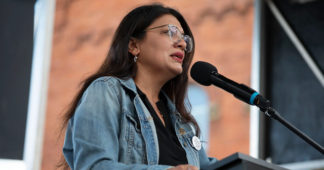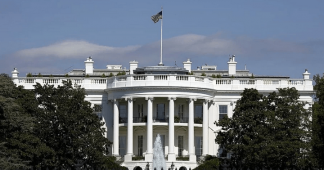As protests across the U.S. denounce President Biden for refusing to support a ceasefire in Gaza while arming Israel’s deadly bombardment of Palestine, polls conducted by the Arab American Institute reveal Biden’s support among Arab American voters is plummeting, dropping from 59% to 17% since the 2020 presidential election. “Something horrible is happening to these people, and this administration is turning a blind eye to it,” says James Zogby, the institute’s president. “There are going to be electoral consequences.” He argues the United States has “blown it” in the Middle East after decades of “disappointments.
Nov 7, 2023
Transcript
AMY GOODMAN: This is Democracy Now!, democracynow.org, The War and Peace Report. I’m Amy Goodman, with Juan González.
“No ceasefire, no votes” and “In November, we remember,” those were two chants we heard Saturday in Washington at the largest rally in U.S. history for Palestinian rights. Protesters denounced President Biden for refusing to support a ceasefire in Gaza while sending more arms to Israel as it continues its monthlong bombardment that’s killed over 10,000 Palestinians, including 4,000 children. Polls show Biden’s support among Arab Americans is plummeting. This is Nihad Awad, the head of CAIR — that’s the Council on American-Islamic Relations — speaking at Saturday’s rally.
NIHAD AWAD: No ceasefire, no votes. No ceasefire, no votes. No votes in Michigan. No votes in Arizona. No votes in Georgia. No votes in Nevada. No votes in Wisconsin. No votes in Pennsylvania. No votes in Ohio. No votes for you anywhere, if you do not call for a ceasefire now. … We will make our voices heard more and more. In November, we remember. In November, we remember.
AMY GOODMAN: Nihad Awad, the head of CAIR, said he was speaking in his own capacity.
We are joined now by Jim Zogby, president of the Arab American Institute, joining us now from Washington, D.C.
It’s great to have you with us. If you could talk about these figures, that I’m sure the White House is looking at carefully? In 2020, President Biden had something like 59% support of the Arab American community. Right now it’s at something like 17%. James Zogby, if you can talk about Biden’s stance right now on Israel and Gaza?
JAMES ZOGBY: Thanks, Amy. It’s been a long time since we’ve been together, and I appreciate the opportunity to speak with you.
Look, yeah, the poll is one that we did to get a read on the community. I have never seen, in the 27 years we’ve been polling, my brother and I have been polling Arab Americans, we never saw a movement this dramatic over this short a period of time. The last time we polled Arab Americans was just a few months ago, and the drop since then has been even more precipitous than the drop since 2020.
This issue resonates. It’s big. It’s important. It also is part of a general national trend. Arab Americans are not immune from what the rest of the culture is feeling, and that is that President Biden just is not in control of his own presidency and how he is being portrayed to the American people and to the world. They didn’t elect a Reaganite foreign policy advocate, a neocon who was fighting for freedom there to have freedom here, that kind of rhetoric that comes from the White House. They voted for somebody that focused on a whole bunch of domestic issues to bring domestic peace and tranquility after four years of Donald Trump. And that’s not what they’ve gotten. And I think that, coupled with the Gaza situation, most certainly, is driving these negative numbers. They are deeply disappointed with the position he’s taken on this conflict, and they just are jumping ship.
JUAN GONZÁLEZ: And, Jim Zogby, could you talk about some other aspects of the poll, what the support for a ceasefire was, and also whether there were gender or age or religious differences in those you polled?
JAMES ZOGBY: What was really significant was that across the board — when you get numbers that high, a flip that high or numbers in the 70% range on several questions, like support for a ceasefire, or how important is the Palestinian issue to you, or how disappointed are you with the president’s performance on this issue — all of those numbers were two-thirds or greater. When you get numbers that great, you expect, across the board, to see the crosstabs reading that way. And we did. There was virtually no difference in terms of majorities, regardless of religion, regardless of whether born here or immigrant, or gender or age. Pretty much across the board, there’s frustration and deep disappointment with this president.
And the question I keep getting asked is: Can Biden win them back? The visceral reaction to this issue is so great that in order to do that, something dramatic has to come from the White House. And I’m not sure that the president has the wherewithal to do it. Look, I’ve heard two things from people at the White House. The one is, they’re not going to vote for Donald Trump, because they don’t want — you know, they don’t want back what he was doing during his four years, and so they’ll come around in a year. I told them that — when I heard that, I said, “That’s insulting and dismissive. You have to earn that vote.” They might just as well stay home. They might vote for Cornel West. They might just not vote at all. And it’s not a given that young Arab American women, who want control over their bodies and their healthcare, that older Arab Americans, who want protection for their Medicare or an expansion of healthcare — it’s not clear that they are going to make the decision to vote at all, if they don’t have something to vote for. It worked the last time: “Vote for me because I’m not the other guy.” I’m not quite sure it will work this time.
And, you know, I’ve got an article coming out in The Nation tomorrow that makes the point that it’s not just Arab Americans who are affected this way. It’s young people. It’s progressive Jews. It’s Black, Latino, Asian voters. There’s a significant decline that this president is encountering across the board. And, you know, Gaza is playing into it. It is a sort of a canary-in-the-coal-mine issue. It’s one that sort of is speaking to a broader sense of dissatisfaction. And the White House has to get a handle on that, not just dismiss it.
JUAN GONZÁLEZ: And speaking of broader sense of dissatisfaction, you worked with Bernie Sanders for two of his campaigns. How do you understand his insistence only on calling for a humanitarian pause and not a ceasefire?
AMY GOODMAN: And, Juan, let me play a clip of Bernie Sanders, who was interviewed this weekend on CNN.
DANA BASH: I want to just clarify one thing, Senator, if I might. You support a humanitarian pause in Gaza. Some of your fellow progressives say that there should be a full-on ceasefire, which would require an agreement on both sides to halt the fighting. Do you support a ceasefire? And if not, why not?
SEN. BERNIE SANDERS: Well, I don’t know how you can have a ceasefire, permanent ceasefire, with an organization like Hamas, which is dedicated to turmoil and chaos and destroying the state of Israel. And I think, what the Arab countries in the region understand, that Hamas has got to go.
AMY GOODMAN: That was Bernie Sanders being interviewed by Dana Bash of CNN. In fact, just a few days ago, Bernie Sanders’ office was occupied by a group of progressives protesting that he wasn’t calling for a ceasefire, among other senators. Jim Zogby?
JAMES ZOGBY: Look, you know, I have no idea. I’ve called the senator, didn’t get a call back; left him a couple messages, text messages, didn’t hear back. And I’m disappointed and, frankly, confounded. I don’t understand the thinking here. One could easily take the sentence that he spoke about “You don’t have a ceasefire with a group like Hamas” that blah, blah, blah, and stick in the Netanyahu government of the most extremist rightists in the country that are today, while under the cover of Gaza, taking armed settlers to evacuate Palestinian villages and force people to leave their lands, leave their orchards and their homes. This is a crazy extremist government. And, yes, Hamas is a group that has done and does evil things, just like the Netanyahu government does evil things. The question is — that’s why you need a ceasefire. And to say we can’t have peace with them, it’s what the Palestinians say: We can’t have peace with the Netanyahu government.
But the problem is that the United States has to act like the adult in the room, and we haven’t. We’ve been the cheerleader, the coat holder, the enabler and the funder of one side, digging the hole deeper every single day. And the result is, is that we’re locked in a conflict here, on Israel’s side, that has no good end in sight. Those who think, “On this path, we’ll eliminate Hamas,” forget what happened in Beirut in ’82, forget what happened in Lebanon in 2006, or what happened in Afghanistan or Iraq. You don’t eliminate. What you do is you create the conditions for something more virulent afterwards. You’re not going to get rid of Hamas. I mean, the million-plus people who have been forced to leave their belongings, their memories, the neighborhoods that they lived in now reduced to rubble, and flee to the south, where there’s no infrastructure to take care of them, the families of the 10,000 who have died, 4,000 of whom children, they’re not going to say when this is over, if it’s ever over, “Oh, we love Israel. Let’s have peace.” There is going to be the seed — there are the seeds being planted today for Hamas 2.0 or something more virulent. And I don’t understand how the folks in the White House or the State Department just don’t get it, and say, “This is not going to end well.” At the end of this path, with the exception of more dead bodies, more anger and more virulent extremism, we’re going to be right back where we started. It’s a failure of the United States, not of Hamas and of Israel, but the United States. We have not shown the leadership — that we ought to be showing, given the fact that we’re funding this damn thing — to stop it.
JUAN GONZÁLEZ: And, James Zogby, you’ve been, for decades now, an expert in public opinion and polling. And it’s not just the United States or England and France where we’re seeing unprecedented demonstrations in support of the Palestinians and opposed to Israeli bombardment and the invasion, but also across the Global South. In the rest of the world, outside of the Western countries, there is virtually no support for the United States’ policies and Israel. I’m wondering if you could talk about that?
JAMES ZOGBY: Yeah. We’ve just finished a poll in 12 Arab countries. I should add, my brother does the domestic polling. We played the game of Risk, and he took one side of the board, and I got the other side of the board. I do polling in the Middle East and some polling in Europe. We’ve done some polling on Ukraine with European countries, their attitude toward it.
But in the Arab world, we’ve blown it. There wasn’t actually much of a bounce when Joe Biden got elected. The damage done by George W. Bush, the disappointment in Obama making promises in Cairo that excited people and then blaming the Arabs for not delivering on the promises he made, and then Trump and the chaos of four years. People have told me there, “We’ve been on a roller coaster with your country for the last 20 years, and, frankly, we’re dizzy right now. We don’t know what we’re getting.” They, too, hoped for calm when Joe Biden got elected. And instead of calm, they have two big wars, and they’re being forced to choose. And frankly, they can’t, because they have decided, as European countries are deciding, that they have to make their own decisions, and they have to do what’s in their interest. And their people are watching what is happening in Gaza and saying, “Hell no, we’re not going to do this anymore.” Even countries that have made peace with Israel, their public opinion has turned decidedly against Israel and decidedly against the prospect of living in harmony with that country. Damage has been done here.
And I don’t understand, in all of my conversations with people at the White House and the State Department, that they don’t just get it. I don’t know what they’re taking in the morning that makes them think, “Today is going to be a better day. Israel is going to kill more people, and Arabs are going to say, ’Let’s have peace with Israel.’” It doesn’t work that way. And I’ve been down this road now for the last 40, 50 years doing this work full time, and, frankly, it gets worse, not better. And those who think you win a victory in a war where you kill lots of civilians, their heads aren’t screwed on right. And frankly, we need new thinking on this, but the guys in the White House aren’t capable, I think, of that kind of new thinking. And it’s really — it’s deeply disturbing, because the hole we’re digging is one that’s going to take a generation to get out of.
AMY GOODMAN: Jim Zogby, I wanted to ask you a few quick questions. I see you have a TV behind you, and I was looking to see if there was a crack in the screen, because I was wondering of your comments on the coverage by the mainstream media. A word you almost never hear — and I’m not talking about Fox, I’m talking about MSNBC and CNN, places where you appear — rarely do we hear the word “occupation,” and why that is so significant in understanding how to end this. We’re not just talking about Gaza; we’re talking about the West Bank. When you had the national security adviser, Jake Sullivan, saying, right before October 7th, you know, “It’s peaceful there in the Middle East. We’re moving on to other issues,” yet at that time you had at least a Palestinian a day being killed in the West Bank by settlers or by the Israeli military. Now I think, since October 7th, the number is well over 150. The OPT, the Occupied Palestinian Territories, Gaza and the West Bank. Question: How we should be talking about this issue, what you think would be the most honest? And do you think there’s a difference between Biden and Trump, not on other domestic issues, but on Israel-Palestine?
JAMES ZOGBY: Joe Biden promised us a lot. He issued not just a platform plank, that was one that they made some accommodations to us about, but they issued a separate policy statement for Arab Americans. And I remember when we wanted language that talked about the equality of human needs and rights, and they issued that statement that both Israelis and Palestinians are equally deserving of, and then there were a litany of words that followed it. Three-and-a-half years later, we’re still waiting for the delivery on the equal promise of. All that Palestinians have gotten has been a green light for Israel to run roughshod over the West Bank, take more land, build more settlements, demolish more homes, more restrictions on Palestinian rights, Jerusalem the same, and Gaza worse. It’s been a huge disappointment.
And frankly, I don’t — I recall some interesting things in the platform debate that still trouble me, because I remember back in ’88 when I was negotiating with Madeleine Albright on the Dukakis-Jackson platform issue, we wanted the word “Palestinian” in the platform. And she told me, she said, “If the P-word even appears in print in the Democratic Party platform, all hell will break loose.” I told her, I said, “Don’t play Chicken Little with me. The sky is not going to fall. We can do it and live with it. I mean, it’s not rocket science to say there are Palestinians in this conflict.” The party had never even mentioned the word up ’til then, and it didn’t that year, either.
What troubled me in 2016 and 2020 was that we couldn’t get the word “occupation” in the platform. They wouldn’t use the word “occupation,” which was Trump language. Trump wouldn’t use “occupation,” either. In fact, they changed the human rights report from reporting on the Occupied Territories to putting it all in one thing. That was the — what do you call it? — by U.S. Ambassador Friedman. Trump’s ambassador wanted it that way. There was no occupation. The Biden administration deals with it as if it were an occupation in language, but not in practice. Not in practice. We have not put conditions or terms on Israel to deal with Palestinians as an occupied people. And so, we’ve kind of come a ways, but we haven’t come anywhere at all, from not using the P-word to not using the “occupation” word. Frankly, it’s maybe a little bit of a semantic thing.
But Palestinians are living under a brutal occupation. It’s an apartheid occupation. And they are also being victims of a genocidal attack on Gaza right now that is killing the infrastructure, killing the people, forcibly evicting over a million people from their homes in the north to move south, where there is no capacity to care for them. They’re living in tents, without water, without power, without healthcare. The hospitals in the south are not capable of dealing with all the issues. And the Israelis are treating the people in the north as if, as the general says, they’re all animals and deserve to die. If that’s not genocide, I don’t know what is.
And yet, this administration, if they can’t use the word “occupation” — and, for God’s sake, they won’t use the word “apartheid” — they can’t use the word “genocide.” Something horrible is happening to these people, and this administration is turning a blind eye to it. And I’m sorry, but when they say, “We’re deeply concerned,” if that’s the best they can do, when we’re providing $14.3 billion additional this year on top of $4 billion, when we’re providing diplomatic cover at the United Nations, that is not enough. And frankly, this, what is happening in Gaza, is not only happening on our watch, but we’re complicit and enabling it. Sounds harsh, but it’s the reality. And they have to deal with it. And there are going to be electoral consequences. And I wish it weren’t so. Last thing on Earth I want to see is a Republican of the type of Donald Trump or whoever comes after in the White House. But they have to earn the vote and establish that there’s a difference. They haven’t done it.
AMY GOODMAN: James Zogby, president of the Arab American Institute, joining us from Washington, D.C.
We remind our readers that publication of articles on our site does not mean that we agree with what is written. Our policy is to publish anything which we consider of interest, so as to assist our readers in forming their opinions. Sometimes we even publish articles with which we totally disagree, since we believe it is important for our readers to be informed on as wide a spectrum of views as possible.











